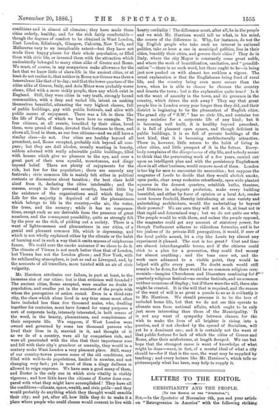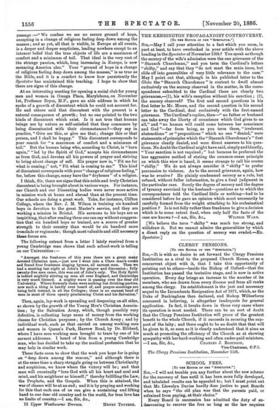LETTERS TO THE EDITOR.
CHRISTIANITY AND THE PEOPLE.
[To 7111 EDITOR or via 87147711101:1 the Spectator of November 6th, you end your article on "Retrogression in America" with the following striking
passage :—" We confess we see no secure ground of hope, excepting in a change of religious feeling deep down among the masses ; and as yet, all that is visible, in Europe at all events, is a deeper and deeper scepticism, leading nowhere except to an intenser belief that the true objects of life are a maximum of comfort and a minimum of toil. That ideal is the very root of the strange passion, which, long increasing in Europe, is now menacing America also." Your " ground of hope in a change
of religions feeling deep down among the masses," is as true as the Bible, and it is a comfort to know how persistently the Spectator has maintained this teaching. I hope to show that
there are signs of this change.
At an interesting meeting for opening a social club for young men and women in Omega Place, Marylebone, on November 1st, Professor Bryce, M.P., gave an able address in which he spoke of a growth of discontent which he could not account for. He and others said that discontent with the present is a natural consequence of growth ; but no one pointed to the two kinds of discontent which exist. Is it not true that human beings are by nature so self-satisfied that they commence by being discontented with their circumstances ?—they say in practice, " Give me this, or give me that ; change this or that person, and I shall be happy." This discontent corresponds to your search for " a maximum of comfort and a minimum of toil." But the human being who, according to Christ, is " born again," " led by the Spirit of God," accepts his circumstances as from God, and devotes all his powers of prayer and striving to bring about change of self. His prayer now is, " Fit me for what is coming ;" not, " Fit what is coming to me." This kind of discontent corresponds with your " change of religious feeling," for, before this change, many have the " drybones " of a religion.
I think, Sir, there are signs that this noble and truly Christian discontent is being brought about in various ways. For instance, our Church and our Dissenting bodies were never more active in mission work at home and abroad than at the present time. Oar schools are doing a great work. Take, for instance, Clifton College, where the Rev. J. M. Wilson is training six hundred boys in devotion to the great Master's service, and they are working a mission in Bristol. His sermons to his boys are so inspiriting, that after reading them one can say without exaggera- tion that six hundred boys so trained, are a source of greater strength to their country than would be six hundred more ironclads or regiments ; though most valuable and still necessary these forces are.
The following extract from a letter I lately received from a young Cambridge man shows that such school-work is telling on our Universities :-
"Amongst the freshmen of this year there are a great many devoted Christian men,—just now I went into a Clare man's rooms and found four freshmen singing hymns, all earnest men. Then we had a meeting last night at John's for prayer and discussion ; fully twenty-five men came, this was out of John's only. The Holy Spirit is indeed mightily stirring up men all over England, and Cambridge is very much blessed. A mighty wave is passing over the dear old
University. Where formerly there were nothing but drinking-parties, now such a thing is hardly ever heard of, and prayer-meetings are being held instead, in all the Colleges ; there is an earnest band of
men in most of them openly proclaiming Christ and his Salvation."
Then, again, lay-work is spreading and deepening on all sides, 83 shown by the growth of the Young Men's Christian Associa- tion ; by the Salvation Army, which, though possibly very defective, is collecting large sums of money from the working classes for Christian purposes ; by the Church Army ; and by individual work, such as that carried on among working men and women in Queen's Park, Harrow Road, by Dr. Hibberd, where I have seen working men brought to tears by one of his earnest addresses. I heard of him from a young Cambridge man, who has decided to take up the medical profession that he may help in similar work.
These facts seem to show that the work you hope for is going on "deep down among the masses," and although there is at the same time a sharp struggle going on between Christianity and scepticism, we know where the victory will be ; and that man will eventually "love God with all his heart and soul and mind, and his neighbour as himself ;" thereby fulfilling the Law, the Prophets, and the Gospels. When this is attained, the war of classes will be at an end; and it is by praying and working for this that each one of us can give a sustaining and lifting hand to our dear old country and to the world, for true love has no limits of country.—I am, Sir, &c.,
12 Upper Westbourne Terrace. HENRY TOYSBEE.



































 Previous page
Previous page